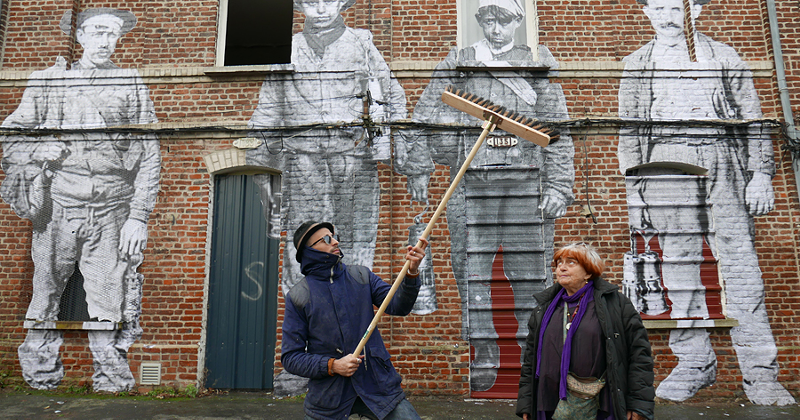JR, the young French street artist who pastes large photographic portraits on outdoor structures, proved quite a hit when the Contemporary Arts Center organized his first U.S. solo museum show in 2013.
The story-telling humanism of his work energized people, as did the dramatic effect of his black-and-white work. He empowers and collaborates with his subjects, who are often societal outsiders because of their age or their economic and political status. His work elevates them — often literally, as when he places their picture on the roof or side of a house or on a water tank or train car. His work has proved so impactful he won the TED Prize, given to someone with a “wish to change the world.”
That prize, as well as the CAC show, was quite an honor, but it’s topped by JR’s latest achievement — the opportunity to collaborate with the French director Agnés Varda, at age 89 his elder by 55 years, on the new essayist documentary Faces Places. It opens Friday at the Mariemont Theatre and is simply wonderful.
The Belgian-born Varda is one of the greats of French New Wave cinema, known for 1961’s Cléo from 5 to 7 and 1984’s Vagabond, both about women, and a 2000 documentary The Gleaners and I. Like JR, she has a background in still photography and likes to work with non-professionals. (She was married to director Jacques Demy, who died in 1990.) So you can see how she could find JR’s work with cameras and images intriguing.
Faces Places is many things. Co-directed by the two, it’s a film about art and photography and the reasons for making images. It’s also a look at the relationship of cinema to still photography, art to life. Taking place in rural France and featuring everyday citizens whom JR and Varda choose to photograph, it’s about the French spirit. It’s also a road-trip movie — a couple roaming about with his unique photo van, a traveling studio and development lab in which oversize photo-posters slide out through a slot on the van’s side. JR is a dapper hipster with his hat and sunglasses — his enthusiasm cheers Varda. But her own sense of style — bowl-shaped hair that’s white on top and auburn around the edges — is pretty hip, too.
Faces Places begins playfully, in classic New Wave fashion, showing scenarios where the two did not first meet — a bakery, on the road. As they begin their trip, the film lets us realize it will not just be about them. In one village, they find an elderly woman living in one of several threatened homes formerly occupied for miners. It’s part of her family heritage and she wants to stay. JR, with Varda’s assistance, creates a photo-poster of her to put on the outside wall; she’s overwhelmed. They also find historic photos of miners, which are turned into wall murals. “We wanted to pay homage to you, on a large scale,” Varda tells the woman.
There are similarly moving encounters and undertakings; you might be hard-pressed to pick a favorite. In one small town, they choose a joyful café waitress as their subject and place a large image of her in the square. Her boss muses that she’s already the town’s most photographed person — customers snap smart phone pictures of her or with her.
But there’s also a subtle, melancholy sense to the film. Varda quietly contemplates mortality, as when she tells JR after meeting and photographing some people: “Every new person I meet seems like the last one.” Yet she can also be wry about her aging. She needs injections into her eye to fight a disease, but tells JR that having watched Luis Buñuel’s 1929 Surrealist film An Andalusian Dog — with its shocking eye-slicing scene — has prepared her. And when JR asks her about an “old friend” — New Wave filmmaker Jean-Luc Godard — she corrects him: “Say longtime friend. It’s nicer for older people.” (Actually, Godard play a crucial, surprising role in the film.)
So keeping in mind Varda’s request to JR, let’s say that Faces Places is a classic of the French Longtime Wave. It will be appreciated for a long time.
CONTACT STEVEN ROSEN: [email protected]


